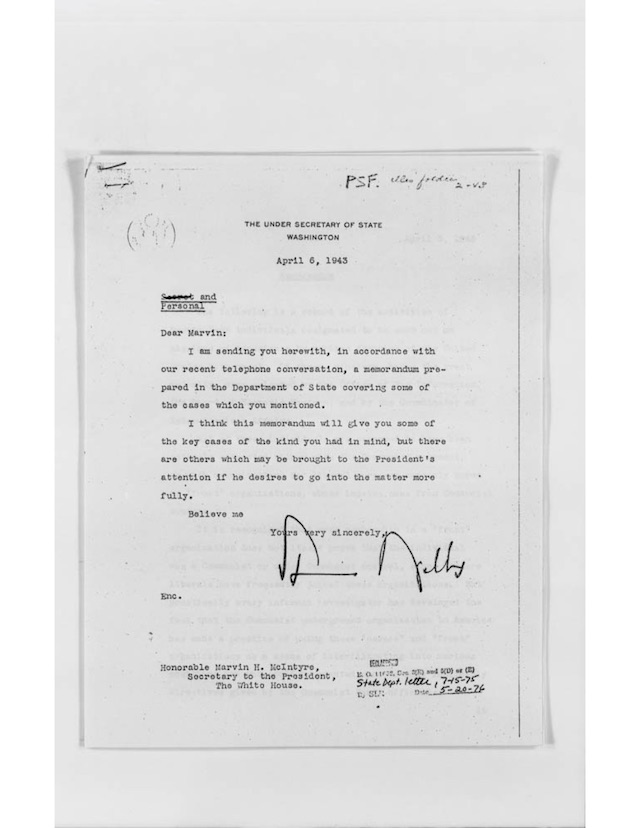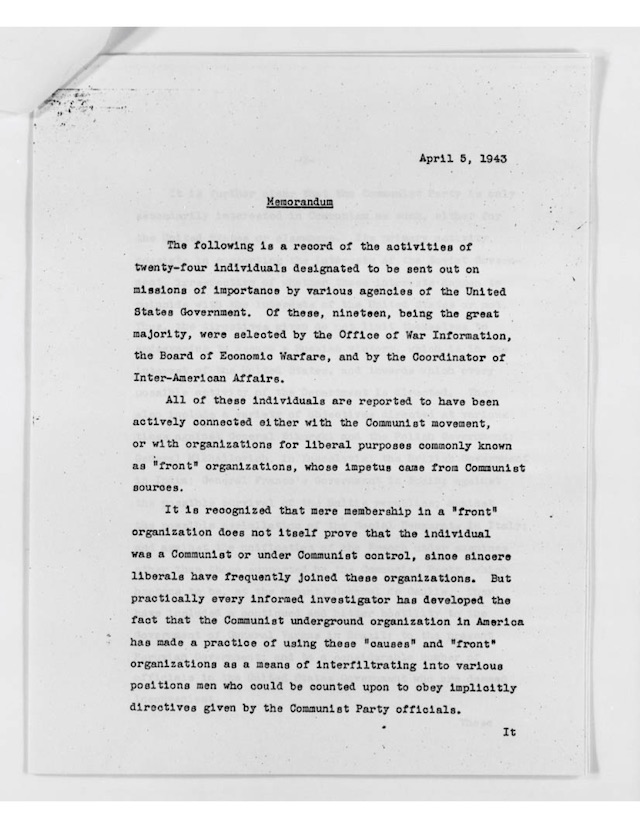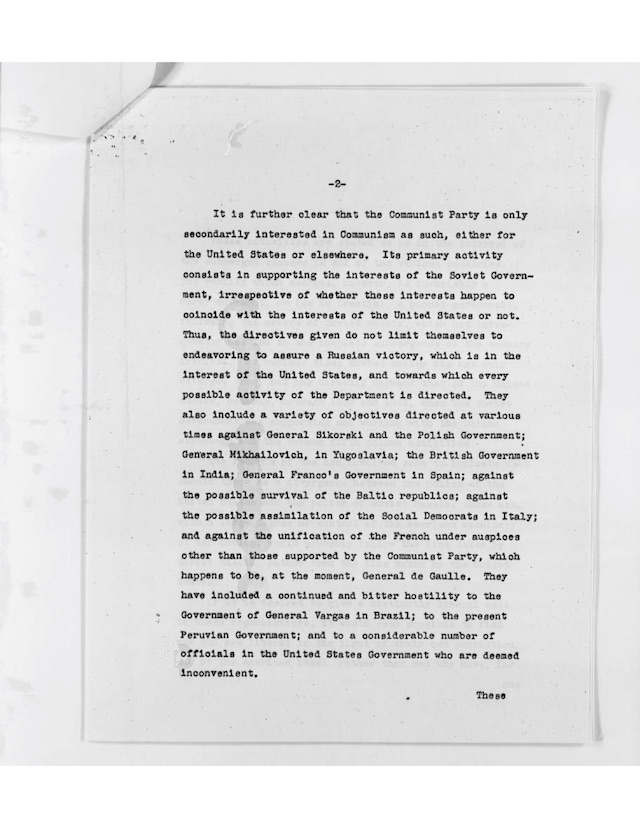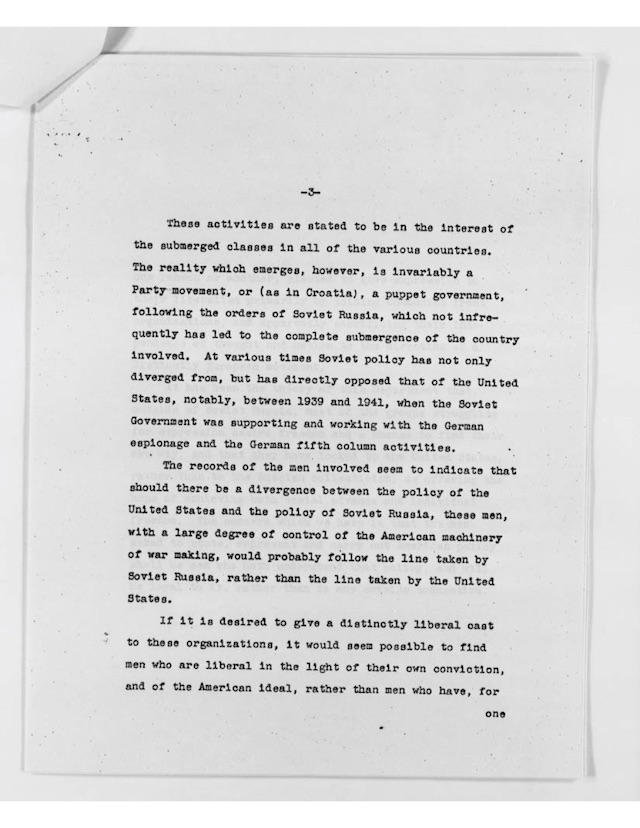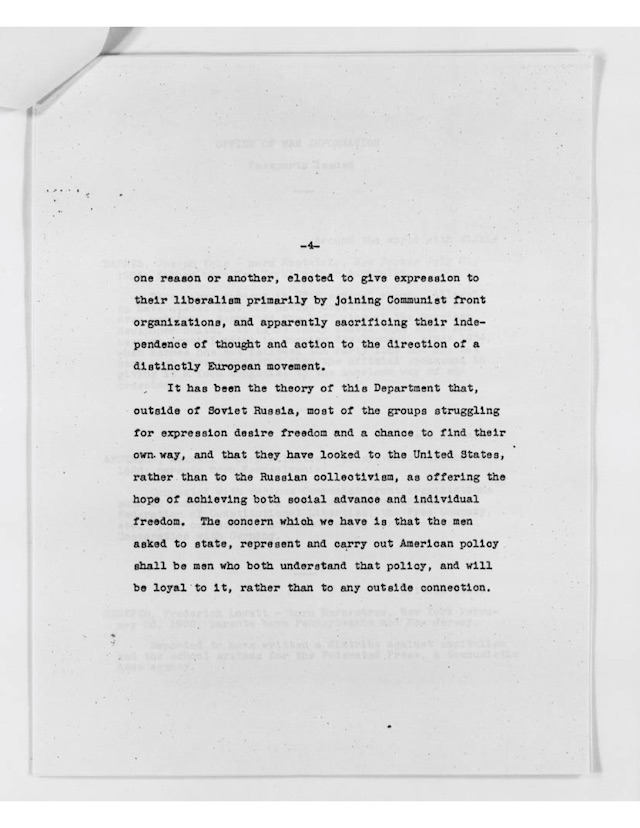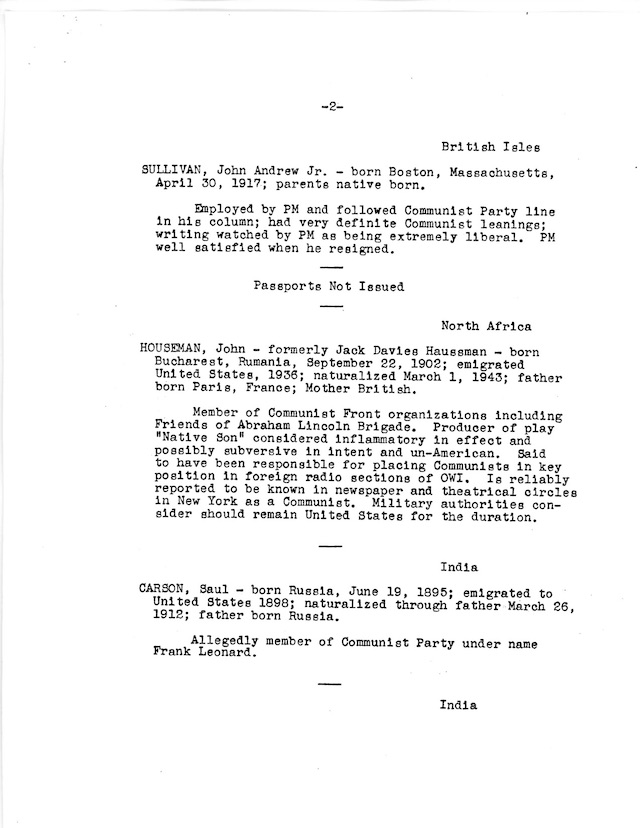Three U.S. Presidents Publicly Rebuked Voice of America for Promoting Foreign Propaganda
Ted Lipien for Cold War Radio Museum
What President Donald Trump said about the U.S. tax-funded, federally-run Voice of America (VOA) during his White House press briefing on April 15, 2020 may have been harsh, especially coming right after an earlier written statement from his White House asserting that VOA was spending tax money to promote foreign propaganda amid a coronavirus pandemic, but other U.S. presidents also openly criticized VOA officials and journalists for putting trust in foreign propaganda. President Roosevelt made his displeasure with VOA known in 1943 and former President Eisenhower harshly criticized VOA in his memoirs published in 1965 a few years after he left his presidential office. They did not use such words as “disgusting” and “disgrace,” which President Trump used, but they were responding strongly to signs of mismanagement at the Voice of America affecting national security of the United States.
Both President Roosevelt and President Eisenhower were right in strongly objecting to foreign propaganda in Voice of America broadcasts and making sure that such propaganda would not continue. Sadly, Donald Trump was also right in his criticism of the current management in charge of U.S. international media outreach for the same reason. Early in the 2016 U.S. presidential election campaign, some Voice of America reporters and editors launched unprecedented partisan attacks on Trump in VOA programs and on their personal social media pages long before he responded with his harsh rebuke in April 2020, but more importantly a number of studies by independent scholars, some of them even commissioned by the agency in charge of VOA, concluded that its programs contained over a period of years unchallenged propaganda from both China and Iran. I found one example of pure propaganda from China’s communist regime in a video produced and posted online by the VOA Mandarin Service on the same day the White House published its criticism of the Voice of America management. I have seen many such one-sided videos and reports with foreign propaganda from China, Iran and Russia on VOA websites and social media pages.
An example is Michael Pack.
He is my nominee for the CEO of the Broadcasting Board of Governors [now U.S. Agency for Global Media (USAGM)]And he’s been stuck in [U.S. Senate] committee for two years, preventing us from managing the Voice of America.
Very important. And if you heard what’s coming out of the Voice of America. It’s disgusting.
What things they say are disgusting toward our country.
And Michael Pack would get in and do a great job, but he’s been waiting now for two years.
[We] can’t get him approved.
We very badly need in this administration.
That should have been approved a long time ago. And one of them is the head of the Voice of America.
If you look at what they’re doing and what they’re saying about our country.It’s a disgrace — the people that are running that.
We have somebody that’s really good, really talented and loves our country.And I want to get these people approved.
That’s one of many.
Current VOA Director Amanda Bennett, who was appointed in 2016 during the Obama administration, rejects criticism of her leadership and management. She disagreed with the White House statements on April 9 and 10, 2020 accusing the Voice of America of promoting propaganda and disinformation from the Chinese communist government in Beijing.
Amanda Bennett said that “VOA News depends on factual unbiased reporting.” She added that “For example, VOA sources the number of COVID-19 cases and deaths both inside individual nations and globally from the Johns Hopkins Coronavirus Resource Center.” “Data from the graphic cited in the White House press release was drawn from Johns Hopkins, which is used throughout the world,” Bennett said.
She did not know or failed to point out if she knew that John Hopkins’ data was based on what U.S. intelligence experts and skeptical journalists, including those working for Radio Free Asia (RFA) which is also overseen by USAGM, believe is unreliable and most likely falsified Chinese communist government data.
Having been spotting and analyzing foreign propaganda for several decades and having lived under communism in my younger years, there is absolutely no doubt in my mind that Voice of America editors and reporters have used Chinese, Iranian and Russian propaganda in recent weeks and years without challenge or proper balance, in most cases unwittingly but in some cases perhaps to score partisan points. I hope there were no other reasons or explanations. This also happened before at the Voice of America for ideological or partisan reasons and through sheer ignorance, but most VOA journalists who have been provided with a false history of their organization don’t know this and some don’t know how to guard against foreign propaganda or one-sided domestic partisan propaganda.
First Voice of America Director John Houseman was forced to resign by the Roosevelt White House in 1943 for allowing too much Soviet propaganda in VOA broadcasts. Yet VOA journalists are still being told today by the current management that Houseman, who had recruited future Stalin Peace Prize winner and Communist Party activist and journalist Howard Fast to be VOA’s first chief news writer and editor in 1943, was a defender of truthful news reporting. He was a pro-Soviet, extreme left-wing propagandist, theatre producer and actor.
The U.S. official who forced Houseman’s departure from the Voice of America was FDR’s friend, Undersecretary of State Sumner Wells, better known for the 1940 Welles Declaration issued by him when he was Acting Secretary of State. It rejected the Soviet annexation of Lithuania, Latvia and Estonia. He also sent a secret memo to the White House in early April 1943 warning of Soviet propaganda influence in the U.S. government agency, the Office of War Information (OWI), which was then responsible for Voice of America broadcasts.
The memo sent to the FDR White House noted the fascination of some American liberals for Soviet communism and urged finding other liberal individuals—not communist sympathizers—to be put in charge of U.S. government information programs.
If it is desired to give a distinctly liberal cast to these organisations, it would seem possible to find men who are liberal in the light of their own conviction, and of the American ideal, rather than men who have, for one reason or another, elected to give expression to their liberalism primarily by joining Communist front organizations, and apparently sacrificing their independence of thought and action to the direction of a distinctly European movement.
Sumner Welles also pointed out:
The records of the men involved seem to indicate that should there be a divergence between the policy of the States and the policy of Soviet Russia, these men, with a large degree of control of the American machinery of war making, would probably follow the line taken by Russia, rather than the line taken by the United States.
A lot of pro-Soviet propaganda was promoted by VOA during World War II with full and often enthusiastic approval from the White House, but when VOA officials and broadcasters hired by Houseman started to put lives of American soldiers at risk in North Africa and Italy by too much propaganda supporting Soviet and communist interests, Houseman was quietly fired and VOA later received a public rebuke from President Roosevelt himself for undermining vital U.S. diplomatic, military, and security interests. The State Department, with the support from the U.S. Military Intelligence, refused to issue Houseman a U.S. passport for official government travel abroad on VOA business. Subsequently, he had no choice but to resign. None of this information, however, was made public at the time.
Some of the programming and management scandals at the Voice of America eventually became public when various members of Congress made speeches on the floor of the House and the Senate warning about Soviet influence within the Office of War Information. Such congressional criticism continued throughout the war and even as late as 1951, Congressman Richard B. Wigglesworth (R-MA), future U.S. Ambassador to Canada, described VOA programs as “uninteresting, drab, bureaucratic in tone, and unconvincing.”
In 1943, in the middle of the war, the U.S. Congress almost completely defunded domestic propaganda programs of the Office of War Information. When VOA officials and journalists took their pro-Moscow zeal too far and in their broadcasts abroad threatened a critical U.S. diplomatic initiative in Italy because Communists voiced their objections, President Roosevelt made a rare public statement designed to bring a measure of control and limit foreign propaganda interference in U.S. foreign and information policy. On July 28, 1943, the New York Times published a front-page report by its Washington correspondent and bureau chief Arthur Krock under the headline: “President Rebukes OWI for Broadcast on Regime in Italy.”
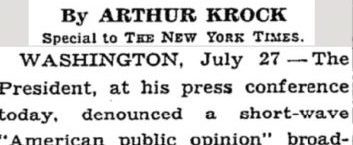
PRESIDENT REBUKES OWI FOR BROADCAST ON REGIME IN ITALY
Personal Attack on King and Fascist Label for Badoglio Strongly Denounced
By Arthur Krock for THE NEW YORK TIMES, July 27, 1943, published July 28, 1943, Pages 1 and 5.
WASHINGTON, July 27 — The President, at his press conference today, denounced a short-wave “American public opinion” broadcast to Europe by the Office of War Information yesterday in which King Victor Emmanuel of Italy was styled “the moronic little King” and “the Fascist King” and Marshal Badoglio was described as a “high-ranking Fascist.”
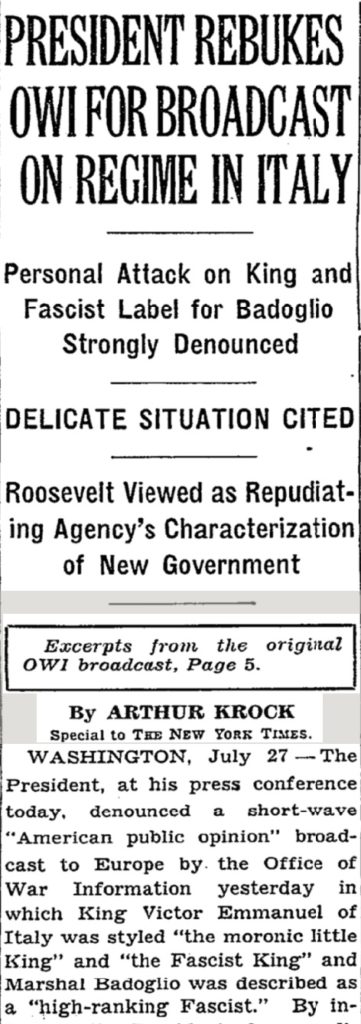
PRESIDENT REBUKES OWI FOR BROADCAST ON REGIME IN ITALY
Personal Attack on King and Fascist Label for Badoglio Strongly Denounced
By Arthur Krock for THE NEW YORK TIMES, July 27, 1943, published July 28, 1943, Pages 1 and 5.
WASHINGTON, July 27 — The President, at his press conference today, denounced a short-wave “American public opinion” broadcast to Europe by the Office of War Information yesterday in which King Victor Emmanuel of Italy was styled “the moronic little King” and “the Fascist King” and Marshal Badoglio was described as a “high-ranking Fascist.”
John Houseman was already gone, but Soviet sympathizers and communists hired by him to produce VOA broadcasts followed the Kremlin’s line that everyone in Italy except for Italian communists was either a Fascist or tainted by Fascism.
President Roosevelt, with input from General Eisenhower and the State Department, made a strategic decision, however, to work with Italy’s King Victor Emmanuel and Marshal Pietro Badoglio. His and General Eisenhower’s objective was to get Italy out of the alliance with Nazi Germany as quickly as possible, in the hope of shortening the war and limiting losses of American and other allied troops.
On July 27, 1943, President Roosevelt said in reply to a question that neither he nor anybody else in his administration was consulted about the Voice of America broadcast. He added that “the broadcast should never had been made and that Mr. Sherwood [Robert E. Sherwood–Hollywood playwright, FDR’s speechwriter and the head of OWI’s Overseas Division where VOA broadcasts were produced] was taking vigorous steps by way of reprimand.”
With John Houseman already gone, several more pro-Kremlin sympathizers were fired although their departure was also presented publicly at the time as being voluntary.
New York Times Washington bureau chief Arthur Krock who wrote the report provided an analysis of the management crisis within the agency in charge of the Voice of America broadcasts. The New York Times reporter noted that the OWI bureaucracy’s first explanation was that the Voice of America broadcast merely reflected American public opinion by quoting individuals opposed to “toleration of fascism” and to “any relaxation of … unconditional surrender.” It was a lie because one of the VOA commentators was an OWI official, James Warburg, writing under a pseudonym.
Arthur Krock wrote a harsh but accurate assessment for New York Times readers that some of the officials in charge of the Voice of America and some of its journalists became agents of influence for the Kremlin through their willingness to accept and repeat Soviet propaganda to the detriment of U.S. national interest and national security.
The selections of opinions made by the OWI were drawn heavily from purely personal journalistic sources–otherwise undistinguished–which have opposed the President’s Vichy and North African policies and usually produce an “ideology” that conforms much more closely to the Moscow than to the Washington-London line.
The explanation [from OWI officials] also failed to deal with the high official view here that the New York shortwave department of the OWI [Voice of America] deliberately and constantly borrows from these sources to discredit the authorized foreign policy of the United States Government, or to reshape it according to the personal and ideological preferences of Communists and their fellow-travelers in this country.
Over his 60-year career, Arthur Krock won three Pulitzer Prizes. On April 22, 1970, he was presented with the Presidential Medal of Freedom by President Richard Nixon.
After leaving the White House in 1961, former President Dwight D Eisenhower briefly alluded in his memoirs Waging Peace (1965) to the Voice of America’s wartime record of collusion with Soviet Russia. As a military leader during World War II, he must have been still upset to have mentioned the incident years later during the Cold War with the Soviet Union when VOA was already playing a useful although still less than fully effective role in countering Soviet propaganda. General Eisenhower had been actively engaged in earlier efforts to create Radio Free Europe (RFE) and Radio Liberty (RL) as more effective media outlets against the Soviet Union. His critical comment appeared in a footnote to a paragraph in which he expressed his own concerns with what he saw as Voice of America’s unethical journalism in support of partisan political advocacy in one foreign policy incident during his own administration.
DWIGHT D. EISENHOWER: In Washington I had been told that a representative of the Voice of America (our governmental radio overseas) had tried to obtain from a senator a statement opposing our landing of troops in Lebanon. In a state of some pique I informed Secretary Dulles that this was carrying the policy of ‘free broadcasting’ too far. The Voice of America should, I said, employ truth as a weapon in support of Free World, but it had no mandate or license to seek evidence of lack of domestic support of America’s foreign policies and actions.”
[Footnote in “Waging Peace” by Dwight D. Eisenhower]“During World War II the Office of War Information had, on two occasions in foreign broadcasts, opposed actions of President Roosevelt; it ridiculed the temporary arrangement with Admiral Darlan in North Africa and that with Marshal Badoglio in Italy. President Roosevelt took prompt action to stop such insubordination.”[ref]Dwight D. Eisenhower, The White House Years: Waging Peace 1956-1961 (Garden City: Doubleday & Company, 1965) 279.[/ref]
Ted Lipien is a former VOA acting associate director, former VOA Eurasia Division director, former Broadcasting Board of Governors Eurasia marketing director and former VOA Polish Service chief during Solidarity’s struggle for democracy in Poland.
